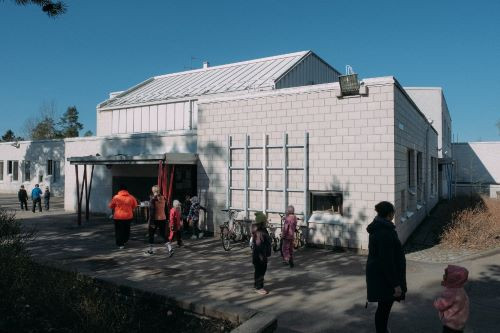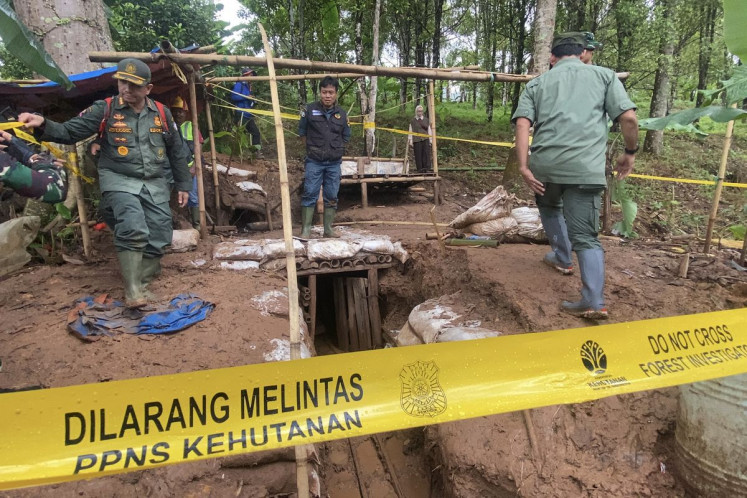Popular Reads
Top Results
Can't find what you're looking for?
View all search resultsPopular Reads
Top Results
Can't find what you're looking for?
View all search resultsSchool meals in Finland: Investment for a happier future
Finland, as the first country in the world to provide free meals to students at schools nationwide, is ready to share its knowledge and experience in cooperation with Indonesia as the two countries celebrate 70 years of diplomatic relations.
Change text size
Gift Premium Articles
to Anyone
E
ducation is one of the cornerstones of the Finnish welfare society. Finland invests in its education because it is seen as an investment in the people and their welfare.
Brain power matters. The Programme for International Student Assessment (PISA), a study evaluating the educational systems of countries by the Organisation for Economic Co-operation and Development (OECD), has ranked Finland high throughout the years.
Education constantly acquires a large portion of Finland’s total general government expenditure, for instance, 5.5 percent in 2022. However, getting to this point was not an easy feat.
Finland became independent only in 1917 during the upheavals sparked by the collapse of the Russian Empire, which had invaded and occupied us several times over the centuries, and finally annexed and colonized us in 1809. We believed these issues would belong to the past, yet regrettably, we have been proven wrong time and again.
Before our independence, we depended on agriculture and forestry, despite the harsh climate of Northern Europe.
Valuing education has long roots: In the 19th century, it was realized that we had only two “natural resources”: our forests and human capital, or our people and their potential talent. In those days, you were not allowed to marry if you could not read.
To increase overall school participation and ensure pupils have enough energy to learn, as well as to address the broader postwar poverty and malnutrition, Finland became the first country in the world to provide free school meals nationwide in 1948.
The school meal system Finland developed is a social innovation that keeps on giving. The system has contributed to the high-quality human capital in our country, which then became an ever-revolving innovation that gears our economy.
We believe that education is among the factors that made our transition into an industrialized, yet also sustainable, country.
Coincidentally, over the past seven years, Finland has been ranked as the happiest country globally in the World Happiness Report. This further proves that our social system plays a role in building a cohesive nation where people can feel safe about their basic needs.
The Finnish school meal model of today was not an instant product. Rather, it is the result of years of research and adaptation based on the dynamics of the state and society. The free school meal scheme that Finland developed is a knowledge-driven process.
For instance, initially in the 1950s, school meals mainly focused on soup or porridge. Gradually, Finland started to develop more diverse meals while also taking feedback from students. In 1995, as part of Finland’s participation in the European Union’s school milk scheme, milk was introduced as part of complimentary school meals, given that dairy farming is a big part of the Finnish agricultural sector.
Since 2004, the school meal program has been incorporated into Finland’s national core school curriculum, giving the system an educational status. The program gives students food-related knowledge and skills regarding healthy diets and local food cultures. The idea is to create a well-balanced meal for students, but also to teach them why a meal should be nutritious, and even how to prepare it.
The school meal setup in Finland is typically a self-service buffet, where students can modify their meals based on their wants and needs. The school offers warm meals that include carbohydrate- and protein-based meals with sides of vegetables, fruits and salad, as well as milk.
The school meal program is a multi-stakeholder system. In Finland, several ministries, such as the Ministry for Social Affairs and Health, have established the necessary policy framework and funding for the program. Specialized agencies, such as the Finnish National Agency for Education and the Finnish Food Authority, provide technical guidance and recommendations.
Cities or municipalities administer the program themselves. This institutional design enables local authorities to make decisions based on local dietary conditions and special needs. Universities also play a role as research institutions to develop better policies.
The school meal program is based on cooperation and trust. All stakeholders actively and effectively coordinate with each other. Constant monitoring and evaluation ensure that the system is running well.
The well-being of students is key. School meals not only contribute to gender equality, but also ensure that the wider objectives of societal and economic development are met. When parents do not need to worry about their children’s meals at school, both parents can work if they choose to.
Finland is a founding member and cochair of the Global School Meals Coalition, which was set up in 2021. The overall global goal of the coalition is that every child has the opportunity to receive a healthy, nutritious meal in school by 2030. This is to be achieved through various country-to-country exchanges as well as other initiatives at the regional level. As of now, 100 countries and three regional bodies are members of the coalition.
Every society is unique and thus, the educational system and school meal program should be tailored to local conditions. Information sharing and collaboration are of the essence. Finland stands ready to cooperate, as well as to share its expertise and experience, with Indonesia.
As Finland and Indonesia celebrate the 70th anniversary of diplomatic relations this year, may the school meal program become one aspect of bilateral cooperation that connects our nations on the path to prosperity and happiness.
***
The writer is the Finnish ambassador to Indonesia.











